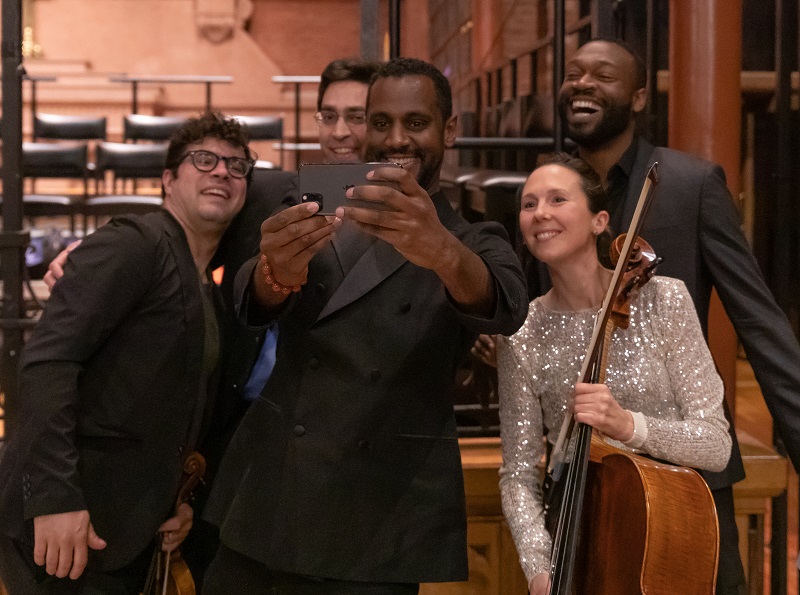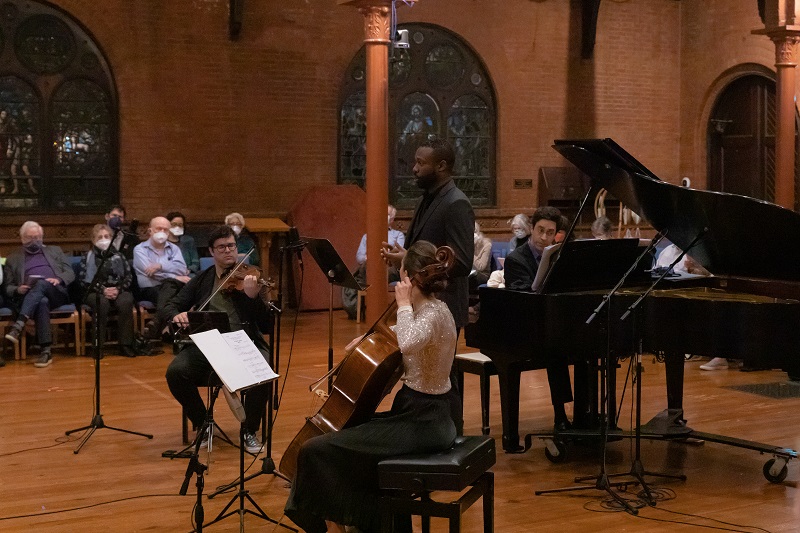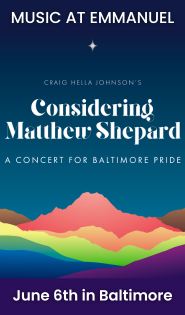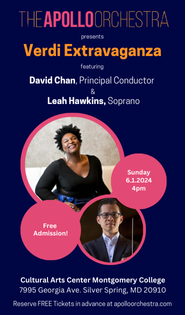Chiarina Chamber Players whets appetite with food-themed Carlos Simon premiere

Chiarina Chamber Players and baritone Carl DuPont performed a new piece by Carlos Simon (center) Friday night. Photo: Harsh Atit
Lamentation and laughter, strangely, often go together in times of tragedy. These opposing expressions of extreme emotion united the latest program from Chiarina Chamber Players on Friday night. The ensemble’s co-founders, cellist Carrie Bean Stute and pianist Efi Hackmey, joined violinist Domenic Salerni, of the Attacca Quartet, and baritone Carl DuPont for this intriguing concert at St. Mark’s Episcopal Church on Capitol Hill.
The three instrumentalists opened the evening with Dvořák’s Piano Trio No. 4. The piece’s other title, “Dumky,” is the plural form of dumka, a Ukrainian folk lament usually contrasted with a happier, faster section. Eschewing the piano trio’s traditional forms, the composer simply linked six such pieces together in a long musical chain.
Salerni and Stute wove together unaccompanied keening lines in the first movement, contrasted by a turbo-charged B section featuring feather-light pianism from Hackmey. Stute took the lead in the more melancholy second movement, with violin and piano supporting and then helping to drive the fast section forward with a folk-style accelerando. Hackmey took the piano part in the third movement with spontaneity, although the violin double-stops turned sour at times.
The fourth movement moved ahead with urgency, enlivened by a playful accelerando, again with strong solo work from Stute’s ardent cello. All three players gave a virtuosic edge to the last two movements, with fast tempos providing strong contrasts to the soulful lament sections. Salerni’s G string croaked with solid power in the finale, the agitated B section brisk but still marked by subtle phrasing from all parts.
DuPont and Hackmey performed Nightsongs, a song cycle from 1961 by the Ohio-born composer H. Leslie Adams. It sets poetry by Langston Hughes and other writers of the Harlem Renaissance, begun by Adams after meeting Hughes in New York. DuPont brought a rich, vibrato-heavy tone to the first two songs, both on texts by Hughes, the cooler “Prayer” distinct from the more active “Drums of Tragedy.”
Hackmey accompanied judiciously, so as not to cover the baritone, especially in the two central songs, both by women associated with the Harlem Renaissance, Clarissa Scott Delaney’s “Night Song” and Georgia Douglas Johnson’s “The Heart of a Woman.” DuPont’s vibrato became more prominent, sometimes obscuring the center of the pitch in “Sence You Went Away,” a poem in dialect by James Weldon Johnson, who also wrote the lyrics of “Lift Every Voice and Sing.” The last song, “Creole Girl,” added some lift with a faster tempo.
The mood turned bleak again with the string duo The World Is Aflame by Christopher Theofanidis. Commissioned for the Juilliard School’s centennial and premiered in 2006, the tragedy it reflects on was the September 11 attacks and the wars that ensued. Salerni hacked away viciously at the many dissonant double-stops, hair-raising clashes that became wearisome, with Stute fiercely dispatching challenging running figures. The work ended on hammered clusters, the two sides unrelenting and unresolved until the end.

Chiarina Chamber Players and Carl DuPont (standing) at St. Mark’s on Capitol Hill. Photo: Harsh Atit
As the pandemic hopefully recedes from the world, composers will be bringing us new works inspired by the bizarre and horrid circumstances of the past two years. Some will miss the mark, like the song cycle heard earlier this week by Jake Heggie. The world premiere that ended this concert, The Best Cuisine by Carlos Simon, may find an enduring place with performers because it captures something joyful from the age of coronavirus: the home cooking craze.
Simon, in a brief introduction, said he did a lot of cooking during the lockdown period, as most of us did. DuPont emailed the composer a lot of recipes, and DuPont adapted words from those messages for the texts of these five songs. It opened with “Grace,” a preprandial prayer set in a relaxed, pleasingly tonal harmonic idiom. The violin and cello finally achieved some independence with lines woven into a contrapuntal “Amen” with the voice and piano.
The range here suited DuPont’s voice better than the lower-set Nightsongs, and his heavily trilled Rs in “Salmon with Kale” added another degree of fun to the spicy tango accompaniment. DuPont hammed up the blues-tinged lines of “Mac and Cheeze,” matched with funky piano chords and string pizzicati and bends. Salerni and Stute shared an introspective interlude, without piano, that led beautifully into the fourth song.
“Roux” was a swiftly swirling waltz, perhaps recalling Ravel’s La Valse or a tarantella, that spun wildly as DuPont spoke, sang, and spat a series of evocative verbs (“Suck, slurp, slurp, chew, chow,” is just one line). Hackmey continued the evocation of Ravel in a brief piano interlude that led to the fifth song, “Healthy Ramen,” which bounced with the spirit of a Latin dance, complete with percussive touches from the strings.
Chiarina Chamber Players perform more music by living composers for their season finale 7:30 p.m. May 8, with selections by Danielpour, León, Sheng, and others. chiarina.org



